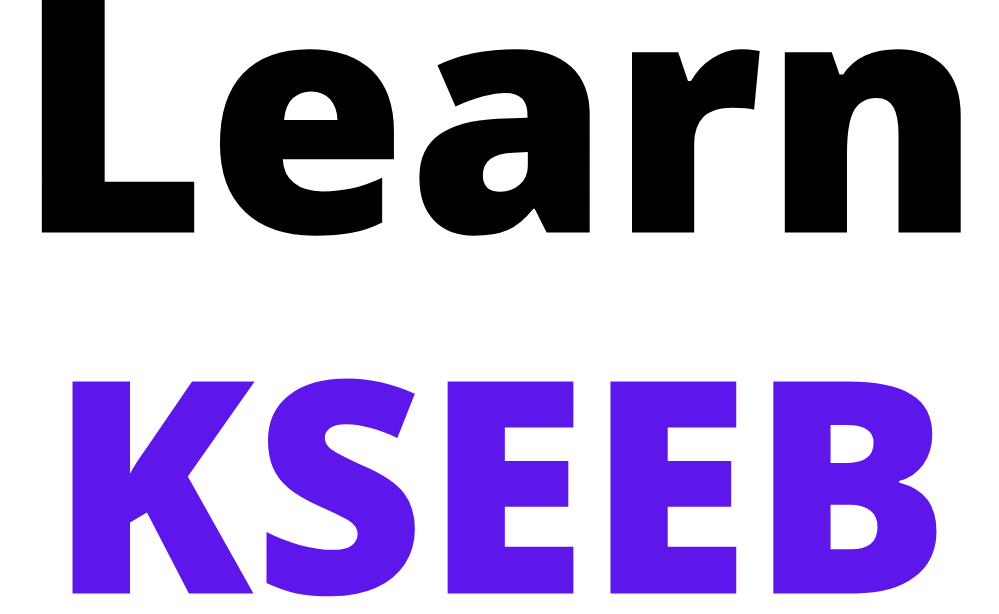KSEEB Solutions For Class 9 Maths Chapter 4 Linear Equations in Two Variables
Linear Equations in Two Variables Points to Remember
- The standard form of a linear equation in two variables x & y is ax+ by+c = 0, where a, b & c are real numbers & a ≠ 0, b ≠ 0
Solution of a linear equation
- Infinitely many solutions of a linear equation in two variables can be obtained.
- To find a solution of a linear equation in two variables easily, we put X- 0 in the equation & find the corresponding value of y, we can also put y = 0, & find the corresponding value of x
- Every point on the graph of a linear equation in two variables represents a solution of the linear equation. Also, every solution of the linear equation represents a point on the graph of the linear equation.
| Class 9 Social Science | Class 9 Science | Class 9 Maths |
Graph of a linear equation in 2 variables
- We find two convenient solutions of a linear equa¬tion in two variables & plot them on a graph paper. Then we join these points by a ruler to get the line which represents the graph of the given linear equation in two variables.
Equations of lines parallel to the x- axis & y- axis. - x= a represents a straight line parallel to y – axis at a distance of | a | units from 0 to be right or left of 0 according as a is +ve or -ve. Similarly y= a represents a straight line parallel to x – axis at a distance of | a | units from 0 above or below 0. According as a is +ve or -ve.
- The equation of the form y= mx represents a line passing through the origin.
Read and Learn More KSEEB Solutions for Class 9 Maths
Linear Equations in Two Variables Exercise 4.1
1. The cost of a notebook is twice the cost of a pen. Write a linear equation in two variables to represent this statement.
Solution: Let the cost of a notebook be x & the cost of a pen by y
Then, according to the given condition of the question,
x=2y
=> x-2y=0
This is the required linear equation in two variables x&y.
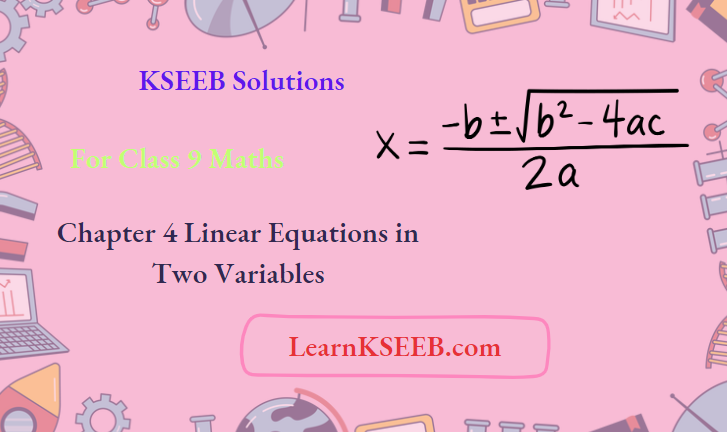
2. Express the following linear equations in the form ax+ by+c= 0 & indicate the values of a, b & c in each case.
1) 2x+3y = 9.35
2)\(2 x+3 y=9.3 \overline{5}\)
3) -2x+3y=6
4) x=3y
5)2x = -5y
6) 3x+ 2 = 0
7) y- 2 = 0
8) 5 = 2x
KSEEB Class 9 Maths Chapter 4 Solutions PDF
Solution: 1) \(2 x+3 y=9.3 \overline{5}\)
\(\begin{gathered}
\Rightarrow \quad 2 x+3 y-9.3 \overline{5}=0 \\
a=2, \quad b=3, \quad c=9.3 \overline{5}
\end{gathered}\)
2) \(x-\frac{y}{5}-10=0\)
\(a=1 \quad b=\frac{-1}{5} \quad c=-10\)
3) \(-2 x+3 y=6\)
\(\begin{aligned}
& \Rightarrow \quad-2 x+3 y-6=0 \\
& a=-2 \quad b=3 \quad c=-6
\end{aligned}\)
4) \(x=3 \mathrm{y}\)
\(\begin{aligned}
& \Rightarrow \quad x-3 y=0 \\
& a=1 \quad b=-3 \quad \mathrm{c}=0
\end{aligned}\)
5) \(2 x=-5 y\)
\(\Rightarrow \quad 2 x+5 y=0\)
\(a=2 \quad b=5 \quad c=0\)
6) \(3 x+2=0\)
\(\begin{aligned}
& \Rightarrow \quad 3 x+o y+2=0 \\
& a=3 \quad b=0 \quad c=2 \\
&
\end{aligned}\)
7) \(y-2=0\)
\(\begin{aligned}
& \Rightarrow \quad 0 x+y-2=0 \\
& \begin{array}{lll}
a=0 & b=1 & c=-2
\end{array} \\
&
\end{aligned}\)
8) \(5=2 x\)
\(\begin{aligned}
& \Rightarrow \quad-2 x+o y+5=0 \\
& a=-2 \quad b=0 \quad c=5
\end{aligned}\)
Linear Equations in Two Variables Exercise 4.2
1. Which one of the following options is true & why? y = 3x+5 has
1) a unique solution
2) only two solutions,
3) infinitely many solutions
Solution: The true option is (3)
y = 3 x+ 5 has infinitely many solutions.
Reason: For every value of x, there is a corresponding value of y & vice versa
2. Write four solutions for each of the following equations.
1) 2x+y=7
Solution:
\(\begin{aligned}& 2 x+y=7 \\
& \Rightarrow \quad y=7-2 x \\
& \text { when } \quad x=0, \quad y=7-2(0)=7-0=7
\end{aligned}\) \(\begin{array}{ll}
x=1, & y=7-2(1)=7-2=5 \\
x=-1, & y=7-2(-1)=7+2=9 \\
x=2, & y=7-2(2)=7-4=3
\end{array}\)
four solutions are (0,7) (1, 5) (-1, 9) & (2,3)
2) πx+y=9
y=9-πx
When
\(\begin{aligned}& x=0, \quad y=9-\pi(0)=9-0=9 \\
& x=1, \quad y=9-\pi(1)=9-\pi \\
& x=-10, y=9-\pi(-1)=9+\pi \\
& x=2, \quad y=9-\pi(2)=9-2 \pi
\end{aligned}\)
four solutions are (0,9), (1,9-π ),
(-1,9+π), (2, 9-2π)
3) x=4y
Solution: x=4y
when
\(\begin{aligned}& y=0, \quad x=4(0)=0 \\
& y=1, \quad x=4(1)=4 \\
& y=-1, \quad x=4(-1)=-4 \\
& y=2, \quad x=4(2)=8 \\
&
\end{aligned}\)
∴ four solutions are (0, 0), (4,1) (-4, -1) & (8,2)
Karnataka 9th Standard Maths Chapter 4 Notes
3. Check which of the following are solutions of the equation x-2y=4 & which are not
1) (0,2)
Solution: Consider the given equation: x-2y= 4……….(1)
i) (0,2)
Put x=0, y= 2 in (1) we get
x-2y=4
0 – 2(2) = 4
-4 ≠4
∴ (0,2) is not a solution of (1)
2) (2,0)
Solution: (2, 0)
put x=2, y=0 in(1) we get
x—2y=4
2-2(0) = 4
2-0 = 4
2≠4
∴ (2,0) is not a solution of (1)
3) (4,0)
Solution: (4,0)
put x = 4, y= 0 in(1) we get
x-2y=4
4 – 2 (0) = 4
4 = 4
∴ (4,0) is a solution of (1)
4) \((\sqrt{2}, 4 \sqrt{2})\)
Solution:
\((\sqrt{2}, 4 \sqrt{2})\) \(\begin{aligned}& \text { put } x=\sqrt{2}, \quad y=4 \sqrt{2} \text { in (1) } \\
& x-2 y=4 \\
& \sqrt{2}-2(4 \sqrt{2}))=4 \\
& \sqrt{2}-8 \sqrt{2}=4 \\
& -7 \sqrt{2} \neq 4
\end{aligned}\)
∴ \((\sqrt{2}, 4 \sqrt{2})\) is not a solution of (1)
5) (1, 1)
Solution:
(1, 1)
\(\begin{aligned}& \text { put } x=1, \quad y=1 \text { in }(1) \\
& x-2 y=4 \\
& 1-2(1)=4 \\
& 1-2=4 \\
& -1 \neq 4
\end{aligned}\)
∴ (1,1) is not a solution of (1)
4. Find the value of k, if x= 2, y= 1 is a solution of the equation 2x+ 3y= k
Solution : If x=2, y= 1 is a solution of the equation 2x+ 3y=k. Then these values will satisfy the equation.
So putting x= 2 & y= 1 in the equation, we get
2(2) + 3(1) = k
=> 4 + 3-k
=> 7 = k
Linear Equations in Two Variables Exercise 4.3
1. Draw the graph of each of the following linear equations in two variables
1) x+y=4
Solution; x + y =4
y= 4-x


2) x-y = 2
Solution: x – y = 2
=> y = x – 2

3) y = 3x


4) 3 = 2x + y
Solution: 3 = 2x + y
=> y = 3 – 2x

2. Give the equations of two lines passing through (2,14). How many more such lines are there and why?
Solution: The equations of two lines passing through (2, 14) can be taken as x+y- 16 & 7x-y-0
There are infinitely many such lines because through a point an infinite number of lines can be drawn.
3. If the point (3,4) lies on the graph of the equation 3y= ax+7, find the value of a.
Solution: If the point (3,4) lies on the graph of the equation 3y= ax+ 7, then
=> 3(4) = a(3) + 7
=> 12 = 3a + 7
=> 12- 7 = 3a
=> 5 = 3a
=> 3a = 5
=> a =\(5 / 3\)
4. The taxi fare in a city is as follows: For the 1st kilometer, the fare is ₹8 & for the subsequent distance. It is ₹5 per km. Taking the distance covered as x km & total fare as y, write a linear equation for this information & draw its graph.
Solution: Total distance covered = x km
Total fare = ₹y
Fare for the 1 st km = ₹8
Subsequent distance = (x-1) km
Fare for the subsequent distance = ₹ 5(x- 1)
According to the question
y= 8 + 5(x— 1)
=> y=8 + 5x-5
=> y= 5x+3


5. From the choices given below choose the equation whose graphs are given in fig (1) & fig(2)
For fig (1) For fig (2)
1) y = x
2)x+y=0
3) y=2x
4) 2 + 2y =1 x
For fig (2)
1) y= x+2
2)y=x-2
3) y= x+2
4) x+2y=6
Solution: For fig (1)
The correct equation is (2) x+ y = 0
For fig (2)
The correct equation is (3) y=-x+2
KSEEB Class 9 Maths Linear Equations in Two Variables Solutions
6. If the work done by a body on application of a constant force is directly proportional to the distance travelled by the body, express this in the form of an equation in two variables & draw the graph of the same by taking the constant force as 5 units. Also read from the graph the work done when the distance traveled by the body is (1) 2 units (2) 0 units.
Solution: Let the work done by the constant force be y units & the distance traveled by the body be x units.
constant force = 5 units.
W.K.T.
work done = Force x Displacement
=> y= 5x

1) Let A —>(2,0) through A, draw a line parallel to OY to intersect the graph of the equation
y = 5 x at B. Through B draw a line parallel to OX to intersect OY at C. Then, C —> (0,10)
work done when the distance travelled by the body is 2 units =10 units.
2) Clearly y = 0 when x = 0, so, the work done when the distance travelled by the body is 0 unit is 0 units.
7. Yamini & Fatima two students of class IX of a school together contributed ? 100 towards the Prime minister’s Relief Fund to help the earthquake victims. Write a linear equation which satisfied this data. (You may take their contributions as ₹x, ₹ y) Draw the graph of the same.
Solution:
Let the contributions of yamini & Fatima be ₹ x & ₹ y respectively.
Then according to the question
x+y=100
=> y =100-x

8. In countries like USA & Canada temperature is measured in Fahrenheit, where as in countries like India, it is measured in Celsius. Here is a linear equation Fahrenheit to Celsius:
\(\mathrm{F}=\left(\frac{9}{5}\right) \mathrm{C}+32\)
1) Draw the graph of the linear equation above using Celsius for x- axis & Fahrenheit for y- axis.
2) If the temperature is 30°C, what is the temperature in Fahrenheit?
3) If the temperature is 95°F, what is the tem¬perature in Celsius?
4) If the temperature is 0°C, what is the tem-perature in Fahrenheit & if the temperature is 0°F, what is the temperature in Celsius?
5) Is there a temperature which is numerically the same in both Fahrenheit & Celsius? If yes, find it.
Solution:
\(\mathrm{F}=\frac{9}{5} \mathrm{C}+32\)
2) When C=30
Then
\(\mathrm{F}=\frac{9}{5} \mathrm{C}+32\) \(\mathrm{}=\frac{9}{5} \mathrm{x30}+32\)=9×6+32
= 54 + 32
F = 86
∴ Required temperature is 86°F
3) When F = 95° then \(\mathrm{F}=\frac{9}{5} \mathrm{C}+32\)
=> 95 = 9/5 C+32
95-32 = 9/5C
63 = 9/5C
(63 x 5)/9=C
C=35
∴ Required temperature =35°C
4.) When C = 0
Then F = 9/5C + 32
=(9/5) x 0 +32
= 32°F
When F=0, then
\(\begin{aligned}& \mathrm{F}=\frac{9}{5} \mathrm{C}+32 \\
\Rightarrow & 0=\frac{9}{5} C+32 \\
\Rightarrow & 0-32=\frac{9}{5} C \\
\Rightarrow & \frac{-32 \times 5}{9}=C \\
\Rightarrow & C=\frac{-160}{0}
\end{aligned}\)
5) Let the temperature be x numerically then
\(\begin{aligned}& \mathrm{F}=\frac{9}{5} \mathrm{C}+32 \\
& \Rightarrow \quad x=\frac{9}{5} x+32 \\
& x-\frac{9}{5} x=32 \\
& x\left(1-\frac{9}{5}\right)=32 \\
& x\left(\frac{5-9}{5}\right)=32
\end{aligned}\) \(\begin{aligned}
& x\left(\frac{-4}{5}\right)=32 \\
& x=\frac{32 \times 5}{-4} \\
& \Rightarrow \quad x=-40
\end{aligned}\)
∴ Numerical value of required temperature is – 40°
KSEEB 9th Standard Maths Chapter 4 Important Questions
Linear Equations in Two Variables Exercise 4.4
1. Give geometric representations of y= 3 as an equation.
1) in one variable
Solution: In one variable
The representation of y = 3 on the number line is as shown below.
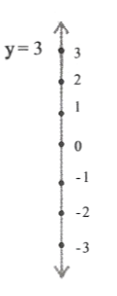
2) in two variable
Solution: In two variables
y=3
=>0 x X+1 x Y =3

2. Give the geometric representations of 2x+ 9 = 0 as an equation.
1) in one variable
Solution: In one variable
2x+9 = 0
=> 2x= -9
=>x=(-9/2)
=>x=-4.5

2) in one variables
Solution: In two variables
2x + 9=0
=> 2x + 0 x y =0
ie x=-9/2, y=0
& x=-9/2, y=0

Additional Problems
1. The standard form of a linear equation in two variables x& y is
- ax+ by + c= 0
- ax = c
- by=c
- x+y+c=0
Solution: 1) ax+ by + c= 0
2. The equation 3x+4y = 12 has
- a unique solution
- no solution
- two solutions
- Infinitely many solutions
Solution: 4) Infinitely many solutions
3. How many lines pass through O?
- 1
- 2
- 4
- Infinitely many
Solution: 4) Infinitely many
4. The force applied on a body is directly proportional to the acceleration produced in the body. Express this in the form of a linear equation in two variables.
- y= x
- y+x=0
- y=kx
- none of these
Solution: 3) y= kx
5. Where does the line 2x+ 3 y=6 cut the x-axis?
- at (3,0)
- at (0,3)
- at (0,0)
- at (3,3)
Solution: 1) at (3,0)
6. Which of the following is a solution of the equation x-y= -1?
- (0,1)
- (1, 0)
- (1,1)
- (2,1)
Solution: 1) (0,1)
7. x= 4 is a line
- parallel to y= -4
- parallel to x- axis
- passing through the origin
- parallel to x= -4
Solution: 4) parallel to x= -4
8. The point of intersection of the lines intersecting the equation 3x = 2y+1 & 2x=3y-1 is
- (2,3)
- (3,2)
- (1,1)
- (0, 0)
Solution : 3) (1,1)
Karnataka Board Class 9 Maths Chapter 4 MCQs
9. The equation of a line parallel to y-axis is
- x=l
- x+ y= 0
- y=0
- y= 1
Solution: 1) x= 1
10. If x= 3 & y= -2 is a solution of the equation 4px- 3y= 12, then the value of p is
- 0
- 1/2
- 2
- 3
Solution: 2) 1/2
Solve
1. Plot the following points in a rectangular co-ordinates system. In which quadrant do they lie?
i) (4,5)
ii) (4, -5)
iii) (-7, 5)
iv)(9,-3)
Solution:
i) I quadrant
ii) IV quadrant
iii) II quadrant
iv) IV quadrant
2. Plot the points (-1,0), (1,0), (1,1), (0,2) (-1, 1) & join them in order. What figure do you get?
Solution:
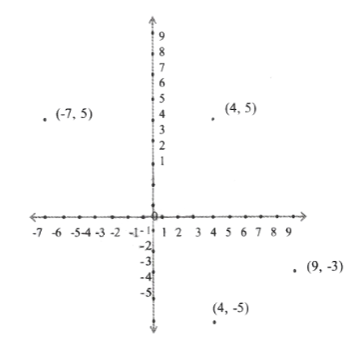
The figure we got is pentagon.
3. In which quadrant will the point lie, if
1) The ordinate is 3 & the abscissa is -4?
2) The abscissa is -5 & the ordinate is – 3?
3) The ordinate is 4 & the abscissa is 5
4) The ordinate is 4 & The abscissa is – 4?
Solution:
1) The point whose ordinate is 3 & The abscissa is -4 lies in II Quadrant.
2) The point whose abscissa is -5 & The ordi¬nate is -3 lies in III Quadrant.
3) The point whose ordinate is 4 & The abscissa is 5 lies in I Quadrant.
4) The point whose ordinate is 4 & The abscissa is -4 lies in II Quadrant.
4. Draw the quadrilateral whose vertices are
1) (1,1), (2,4), (8, 4) & (10,1)
Solution:
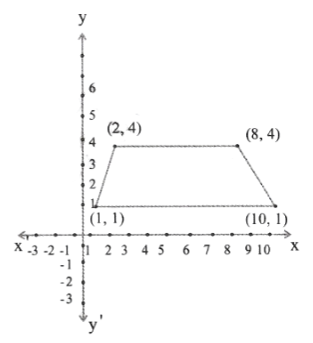
2)(-2,2), (-4,2), (-6, -2) & (-4, -6)
Name the type of quadrilateral so formed in each case.
Solution:
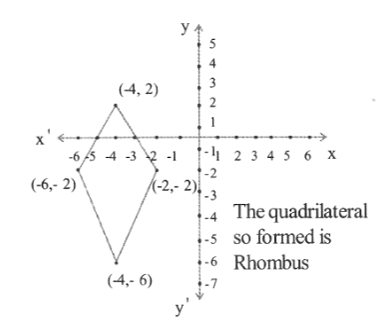
The quadrilateral so formed is a trapezium .
5. Express the linear equation 7 = 2jrin the form ax+ by+ c= 0 & also write the values of a, b & c.
Solution:
7 = 2x
=> 2x-7 = 0
=> 2x+ oy-1 = 0
comparing with ax+by+c= 0
we get a = 2, b = 0, c = -7
6. Find at least 3 solutions for the following lin¬ear equation in two variables 2x+5y= 13
Solution:
2x+5y= 13
=> 5y=13-2x
\(y=\frac{13-2 x}{5}\)put x=0,
\(y=\frac{13-2(0)}{5}=\frac{13}{5}\)put x=1,
\(y=\frac{13-2(1)}{5}=\frac{13-2}{5}=\frac{11}{5}\)put x=-1,
\(y=\frac{13-2(-1)}{5}=\frac{13+2}{5}=\frac{15}{5}=3\)∴ The three solutions are (0,13/5), (1,11/5)
(-1,3)
7. If x = -2, y = 6 is a solution of equation 3ax+ 2by = 6, then find the value of b from 2(a-1) + 2 (3b- 4) = 4
Solution:
If x= -2, y= 6 is a solution of equation
3ax+2by= 6, then
3a(-2) + 2b(6) = 6
-6 a +12b = 6
÷ 6 -3+2b=1…………….. (1)
also 2(a-1) + 2(3b-4) = 4
=> 2a-2 + 6b-8 = 4
=> 2a + 6b-10-4 = 0
=> 2a + 6b-14 = 0
=> 2a + 6b = 14
÷ 2 => a + 3b = 7……………..(2)
adding Eqn (1) & (2) we get
\(\begin{array}{r}-a+2 b=1 \\
a+3 b=7 \\
\hline 5 b=8 \\
b=8 / 5
\end{array}\)
putting b = 8/5 in (1) we get
\(\begin{gathered}-a+2 \times \frac{8}{5}=1 \\
-a+\frac{16}{5}=1 \\
-a=1-\frac{16}{5} \\
=\frac{5-16}{5} \\
-a=\frac{-11}{5}
\end{gathered}\)
∴ a=11/5
Hence a=11/5 & b=8/5
8. Find the coordinates of the points where the line representing the equation \(\frac{x}{4}=1-\frac{y}{6}\) cuts the x-axis & the y-axis
Solution:
\(\frac{x}{4}=1-\frac{y}{6}\)For intersection with x-axis, put y= 0
∴ \(\frac{x}{4}=1-\frac{0}{6}\)
=> x/4=1
=> x=4
∴ The point of intersection with x – axis is (4,0) For intersection with y – axis, put x=0, then
\(\frac{0}{4}=1-\frac{y}{6}\)=> 1-y/6=0
=> y/6=1
=> y=6
Hence the point of intersection with y – axis is (0,6).
9. Determine the point on the graph of equation 2x+5y= 20 where x- co-ordinate is 5/2 times its ordinate.
Solution:
2x+5y= 20
x – coordinate is 5/2 times its ordinate
ie x=5/2y
∴ \(2\left(\frac{5}{2} y\right)+5 y=20\)
5y+5y=10
10y=20
y=20/10=2
∴ \(x=\frac{5}{2} \times 2=5\)
Hence the required point is (5,2)
10. Plot the graph of equations using the same pair of axes;
1) y=2x+3
Solution:
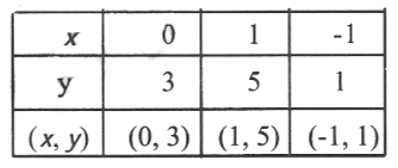
2) y=2x-3/2
Solution:

3) 2 x- y = 0 are these lines parallel?
Solution:
2x-y=0
=> y=2x

11. Shade the triangle formed by the graph of 2x-y=4, x+y= 2 & the axis. Write the coordinates of the vertices of the triangle.
Solution:
2x-y=4
=> y= 2x-4

x+y=2
=> y=2-x

From the graph, we see that the co-ordinates of the verti¬ces of the triangle are (2,0), (0,2) & (0, -4)
The triangle has been shaded.
Class 9 Maths Linear Equations in Two Variables KSEEB Guide
12. Solve for: \(x: 3 x-12+\frac{3}{7} x=2(x-1)\) What type of graph is it in two dimensions?
Solution:
\(3 x-12+\frac{3}{7} x=2(x-1)\) \(\begin{aligned}& 3 x+\frac{3}{7} x-2 x=-2+12 \\
& \frac{3 x}{7}+x=10 \\
& \frac{3 x+7 x}{7}=10 \\
& 10 x=70
\end{aligned}\)
x=70/10
x=7
The graph of this equation is a line parallel to y-axis at a distance of 7 units to the right of origin O.
13. Given the geometrical representation of 2y+ 7 as equation in
1) one variable
Solution:
one variable
2y+7 = 0
=> 2y= -7
y=-7/2

2) two variables
Solution:
In two variables
2y+7=0
=> 0 . x+2y+ 7 = 0
If x=0, y=-7/2

14. 1f the point (3,4) lies on the graph of the equation 3 y = ax+ 7, find the value of a.
Solution:
Since every point on the graph of a linear equation is a solution of the equation.
x = 3 & y= 4 is a solution of the equation 3 y= ax+1
3×4 = ax3 + 7
12 = 3a+7
3a=5
=> a =5/3
KSEEB Maths Chapter 4 Linear Equations In Two Variables Free Solutions
15. Give the equations of two lines passing through (2,14). How many more such lines are there & why?
Solution:
We observe that x= 2 & y= 14 is a solution of each of the equations.
1) 1x- y= 0
2) 3x-y+8 = 0
3) x-y+12 = 0 etc.
We know that passing through a given point infinitely many lines can be drawn. So, there are infinitely many lines passing through (2,14)
16. Draw the graphs of 2x+y=6 & 2x- y+ 2 = 0 shade the region bounded by these lines & x – axis. Find the area of the shaded region.
Solution:
We have
2 x+y=6 & 2x-y+2 = 0
2x+ y=6
=> y = 6-2x
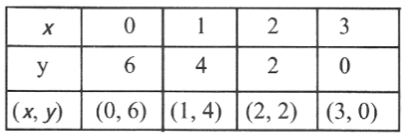
2x- y+2 = 0
=> 2x+2-y
=> y= 2x+ 2
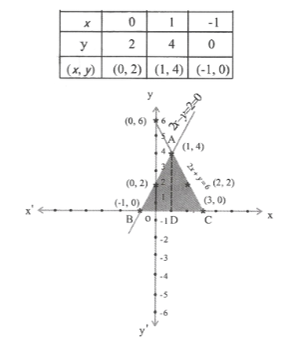
Area of the shaded region = Area of Δ ABC
= 1/2x Base x height
=1/2xBCxAD
=1/2x4x=8
Area of the shaded region = 8 sq. units
KSEEB Class 9 Maths Chapter 4 Exercise Solutions
17. Find out which of the following equations have x = 2, y= 1 as a solution.
1) 2x+5y=9
2) 5x+3y=14
3) 2x+3y= 7
Solution:
1) 2x+ 5y = 9
put x= 2 & y = 1
LHS = 2 (2) +5(1)
= 4+5
= 9
= RHS,
∴ x=2 & y = 1 is a solution of the given equation
2) 5x+3y-14
LHS = 5x+3y
= 5 (2) + 3 (1)
= 10 + 3
= 13
≠14
≠ RHS
∴ x=2 S& y= 1 is not a solution of the given equation.
3) 2x+3y=7
LHS = 2x+3y=7
= 2 (2)+ 3(1)
= 4 + 3
= 7
= RHS
x=2 & y= 1 is a solution of the given equation.
